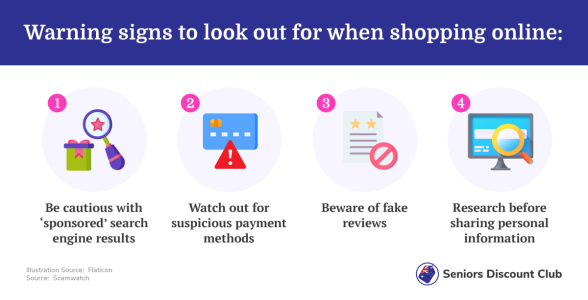Fake fashion retailer preys on unsuspecting shopper via Google search: ‘I wasn't aware’
- Replies 14
Technology often serves to make our lives easier, but it's also a double-edged sword.
Many of us here can no doubt testify to this statement. We've all had moments of confusion due to those ever-changing gadgets, software updates, and other complications that come with living in the digital age.
That being said, for the most part, we are grateful for the way modern technology has changed things for the better. Take online shopping, for example. Not only is it incredibly convenient and time-saving, but nowadays, it's also safe.
Well, mostly...

Camille Warfield, an unsuspecting shopper from Queensland, recently found this out the hard way when she experienced what she now calls the 'weirdest scam'.
The story began when she was looking at puffer jackets in-store at DECJUBA, an Australian fashion retailer. However, her size was unfortunately sold out, so Warfield thought to herself: 'That's fine; I'll just go online and buy it.'
She took out her iPhone and opened the Safari app to search for the clothing website. As she started typing the website's name into Google, the link to the store's website conveniently auto-completed, leading her to believe it was the correct one.
Trusting the autocomplete suggestion, she thought it was safe to press enter. As it turns out, it wasn't.
Little did Warfield know that she had stumbled upon a fake online store, despite being an experienced online shopper herself. This deceptive website had a cleverly camouflaged URL, making it appear legitimate.
Thinking she was making a genuine purchase, Warfield excitedly decided to treat herself to a puffer jacket and matching tracksuit combo, priced at $120.
However, as she proceeded with the transaction, red flags began to surface, indicating that something was amiss.
Warfield said, 'As soon as I paid, I knew it was a scam. I got a confirmation email, which was dodgy as f***. If you looked at the email it was sent from, it was a Gmail account, and everything in the email was just dodgy.'
But it didn't stop there.
Several weeks after her online purchase, Warfield received a notification from Australia Post, which confirmed that a parcel was on its way to her home address. At first, this made her suspicious. 'Was this just another text scam?' she thought.
Much to Warfield's delight (and surprise), the tracking number on the parcel matched that in her Australia Post app and with that, she was sure that something was, in fact, on its way.
But what could it possibly be? 'I thought something was coming, but I don't know what it would be. Maybe it's just a rip-off puffer jacket... I don't know,' she said.
When the parcel finally arrived, Warfield was astonished to find that it was much smaller than she had anticipated.
'Keep in mind I (thought I had) bought a big black puffer jacket, nearly floor length, and a matching tracksuit, so I'm expecting this parcel to be really big,' she said. 'But is this a joke?'
The answer to her question quickly revealed itself when Warfield opened the box to find a bizarre jewellery box with a ring inside.
'If you are a scam website, wouldn't you just take my money? Why would you send me a f***ing ring? That is hilarious. I don't wear silver. Sorry. The funny thing is it actually fits me perfectly. Stop. So this is the weirdest scam I've ever been a part of,' Warfield laughed.
To avoid making the same mistake as Warfield, always remain vigilant for signs of potential fraud. There are several indicators you should look out for:
1. Be cautious with 'sponsored' search engine results: Sometimes, these websites can appear in search engine results, giving them an appearance of legitimacy. However, just because they look genuine doesn't necessarily mean they are. Exercise extra caution when dealing with such websites.
2. Watch out for suspicious payment methods: If a webpage offers only one payment method or asks for payments in gift cards or Bitcoin, it could be a red flag. Legitimate businesses usually provide multiple secure payment options, and asking for unusual payment methods may indicate fraudulent intent.
3. Beware of fake reviews: Some scammers use fake reviews to promote their products or services. If you notice an overwhelming number of positive reviews or overly enthusiastic endorsements without any critical opinions, it's a sign that the reviews might be fabricated.
4. Research before sharing personal information: Before giving away any of your personal information, take the time to research the organisation or person you are dealing with. Utilise secure and authenticated methods to reach the organisation, such as using their official app or portal, rather than relying solely on search engine results.

By staying cautious and following these steps, you can reduce the risk of falling victim to fraud and protect yourself from potential scams. Of course, if you do experience any suspected fraudulent behaviour, you should report it immediately. Best of luck with online shopping, members!
Have you experienced anything similar in the past? How did you deal with it? Share your stories with us in the comments below!
Many of us here can no doubt testify to this statement. We've all had moments of confusion due to those ever-changing gadgets, software updates, and other complications that come with living in the digital age.
That being said, for the most part, we are grateful for the way modern technology has changed things for the better. Take online shopping, for example. Not only is it incredibly convenient and time-saving, but nowadays, it's also safe.
Well, mostly...

An Aussie was duped into shopping from a fake website that copied a popular fashion retailer. Credit: Pexels/Sarah Blocksidge.
Camille Warfield, an unsuspecting shopper from Queensland, recently found this out the hard way when she experienced what she now calls the 'weirdest scam'.
The story began when she was looking at puffer jackets in-store at DECJUBA, an Australian fashion retailer. However, her size was unfortunately sold out, so Warfield thought to herself: 'That's fine; I'll just go online and buy it.'
She took out her iPhone and opened the Safari app to search for the clothing website. As she started typing the website's name into Google, the link to the store's website conveniently auto-completed, leading her to believe it was the correct one.
Trusting the autocomplete suggestion, she thought it was safe to press enter. As it turns out, it wasn't.
Little did Warfield know that she had stumbled upon a fake online store, despite being an experienced online shopper herself. This deceptive website had a cleverly camouflaged URL, making it appear legitimate.
Thinking she was making a genuine purchase, Warfield excitedly decided to treat herself to a puffer jacket and matching tracksuit combo, priced at $120.
However, as she proceeded with the transaction, red flags began to surface, indicating that something was amiss.
Warfield said, 'As soon as I paid, I knew it was a scam. I got a confirmation email, which was dodgy as f***. If you looked at the email it was sent from, it was a Gmail account, and everything in the email was just dodgy.'
But it didn't stop there.
Several weeks after her online purchase, Warfield received a notification from Australia Post, which confirmed that a parcel was on its way to her home address. At first, this made her suspicious. 'Was this just another text scam?' she thought.
Much to Warfield's delight (and surprise), the tracking number on the parcel matched that in her Australia Post app and with that, she was sure that something was, in fact, on its way.
But what could it possibly be? 'I thought something was coming, but I don't know what it would be. Maybe it's just a rip-off puffer jacket... I don't know,' she said.
When the parcel finally arrived, Warfield was astonished to find that it was much smaller than she had anticipated.
'Keep in mind I (thought I had) bought a big black puffer jacket, nearly floor length, and a matching tracksuit, so I'm expecting this parcel to be really big,' she said. 'But is this a joke?'
The answer to her question quickly revealed itself when Warfield opened the box to find a bizarre jewellery box with a ring inside.
'If you are a scam website, wouldn't you just take my money? Why would you send me a f***ing ring? That is hilarious. I don't wear silver. Sorry. The funny thing is it actually fits me perfectly. Stop. So this is the weirdest scam I've ever been a part of,' Warfield laughed.
To avoid making the same mistake as Warfield, always remain vigilant for signs of potential fraud. There are several indicators you should look out for:
1. Be cautious with 'sponsored' search engine results: Sometimes, these websites can appear in search engine results, giving them an appearance of legitimacy. However, just because they look genuine doesn't necessarily mean they are. Exercise extra caution when dealing with such websites.
2. Watch out for suspicious payment methods: If a webpage offers only one payment method or asks for payments in gift cards or Bitcoin, it could be a red flag. Legitimate businesses usually provide multiple secure payment options, and asking for unusual payment methods may indicate fraudulent intent.
3. Beware of fake reviews: Some scammers use fake reviews to promote their products or services. If you notice an overwhelming number of positive reviews or overly enthusiastic endorsements without any critical opinions, it's a sign that the reviews might be fabricated.
4. Research before sharing personal information: Before giving away any of your personal information, take the time to research the organisation or person you are dealing with. Utilise secure and authenticated methods to reach the organisation, such as using their official app or portal, rather than relying solely on search engine results.
Key Takeaways
- Camille from Queensland was duped into shopping from a fake website that mirrored Australian fashion retailer DECJUBA.
- After making the purchase, she realised she was scammed when she received a dodgy confirmation email but got further confused when she received a parcel with a tracking number.
- Instead of the puffer jacket and tracksuit she had ordered, Warfield found a cheap-looking ring inside the package.
- In a statement, DECJUBA confirmed the existence of scam websites posing as their own, and Scamwatch urged Australians to be cautious with fake retail websites mimicking well-known brands.
By staying cautious and following these steps, you can reduce the risk of falling victim to fraud and protect yourself from potential scams. Of course, if you do experience any suspected fraudulent behaviour, you should report it immediately. Best of luck with online shopping, members!
Have you experienced anything similar in the past? How did you deal with it? Share your stories with us in the comments below!








